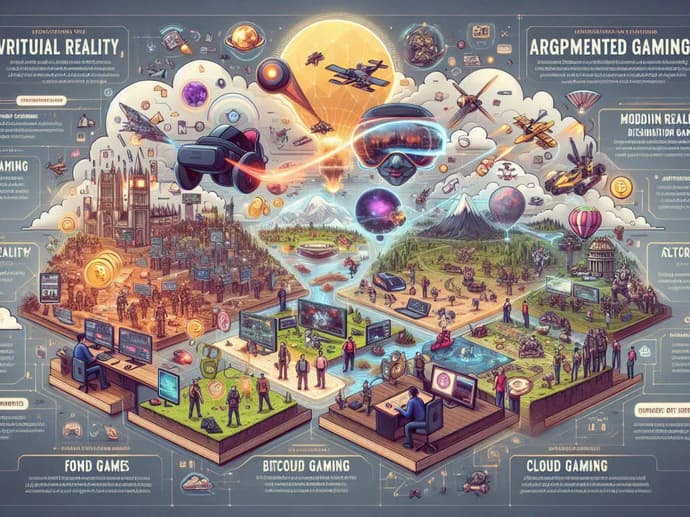
Exploring the Evolution of Online Gaming: Trends and Innovations

The world of online gaming has undergone a remarkable transformation over the past two decades. What began as simple, pixelated games has evolved into a dynamic and immersive industry that spans various genres and platforms. Today, online gaming is a multi-billion-dollar sector driven by technological advancements, innovative gameplay, and a growing community of players worldwide. This article explores some of the most significant trends and innovations shaping the future of online gaming.
One of the most notable trends in recent years is the rise of virtual reality (VR) and augmented reality (AR) technologies. VR gaming offers players an incredibly immersive experience, transporting them into fantastical worlds with high-definition graphics and interactive environments. From exploring alien landscapes to participating in epic fantasy battles, VR games provide a level of engagement that traditional gaming cannot match. AR games, on the other hand, blend digital elements with the real world, creating unique experiences that can be enjoyed anywhere. Popular titles like Pokémon GO have demonstrated the potential of AR to create engaging and socially interactive gaming experiences.
Another significant trend is the growth of mobile gaming. The proliferation of smartphones and tablets has made gaming more accessible than ever before. Mobile games range from casual puzzle games to complex strategy titles, catering to a diverse audience. The convenience of gaming on the go has led to the explosion of mobile gaming platforms and the rise of competitive mobile eSports. Developers are continuously optimizing games for mobile devices, enhancing graphics and gameplay to ensure that players enjoy a seamless experience regardless of their device.
The online gaming community is also benefiting from advancements in cloud gaming. Cloud gaming allows players to stream games over the internet without the need for high-end hardware. This technology eliminates the barriers of expensive gaming consoles and PCs, enabling players to access high-quality games on a variety of devices. Services like Google Stadia and Microsoft xCloud are leading the charge in this area, offering a vast library of games that can be played instantly from virtually anywhere. As internet speeds continue to improve, cloud gaming is expected to become even more prevalent, further democratizing access to gaming.
In addition to technological advancements, the integration of cryptocurrencies into online gaming has introduced new possibilities. One prominent example is the emergence of the bitcoin casino. A bitcoin casino operates using cryptocurrency as its primary currency, allowing players to place bets and make transactions using Bitcoin. The advantages of a bitcoin casino include enhanced privacy, faster transactions, and lower fees compared to traditional banking methods. Furthermore, the decentralized nature of cryptocurrencies ensures that players have more control over their funds and can enjoy a more secure gaming experience. As cryptocurrencies gain mainstream acceptance, it’s likely that more online casinos will adopt Bitcoin and other digital currencies.
Esports is another area experiencing rapid growth. Competitive gaming has become a global phenomenon, with professional players and teams competing in tournaments that attract millions of viewers. The rise of esports has led to the establishment of dedicated leagues, sponsorships, and substantial prize pools. Games like League of Legends, Dota 2, and Counter-Strike: Global Offensive have become household names, and the success of these titles has paved the way for new games to enter the competitive scene. The professionalization of esports is transforming gaming into a legitimate career path for talented players and content creators.
Lastly, the focus on player engagement and community building has become increasingly important. Online games are now designed with social features that encourage collaboration and interaction among players. From in-game chat functions to community forums and social media integration, developers are creating environments where players can connect, share experiences, and build lasting friendships. The emphasis on community-driven content and feedback has also led to more responsive and player-centric game development.
In conclusion, the online gaming industry is continuously evolving, driven by technological innovations and shifting player preferences. Virtual and augmented reality, mobile gaming, cloud gaming, and the integration of cryptocurrencies are just a few examples of the trends shaping the future of gaming. As the industry continues to grow, players can look forward to even more exciting developments and immersive experiences. Whether you’re a casual gamer or a dedicated enthusiast, the future of online gaming promises to offer something for everyone.

Elen Stelmakh er en kreativ person som er opptatt av å fremme spillkulturen gjennom artikler og visuell design. Som heltidsansatt EGamersWorld-forfatter og designer for et spillnettsted skaper Elen ikke bare innhold, men tilfører det også energi og kreativitet.
 Roblox Anime Guardians Koder februar 2026Oppdag alle fungerende Roblox Anime Guardians-koder. Løs inn gratis Mystic Coins, Trait Rerolls, Artefakter og belønninger.
Roblox Anime Guardians Koder februar 2026Oppdag alle fungerende Roblox Anime Guardians-koder. Løs inn gratis Mystic Coins, Trait Rerolls, Artefakter og belønninger. Ikke-britiske nettkasinoer: Spill, formater og hva spillere kan forventeNettkasinoer som opererer utenfor det britiske rammeverket for pengespill, tiltrekker seg oppmerksomhet på grunn av forskjeller i lisensmodeller, spillporteføljer og...
Ikke-britiske nettkasinoer: Spill, formater og hva spillere kan forventeNettkasinoer som opererer utenfor det britiske rammeverket for pengespill, tiltrekker seg oppmerksomhet på grunn av forskjeller i lisensmodeller, spillporteføljer og... Bitcoin-kasinoer og kryptospillplattformer for britiske spillereKryptobaserte spillplattformer har blitt et merkbart segment av det globale markedet for nettkasinoer.
Bitcoin-kasinoer og kryptospillplattformer for britiske spillereKryptobaserte spillplattformer har blitt et merkbart segment av det globale markedet for nettkasinoer. De beste internasjonale nettcasinoene for britiske spillereNettkasinoindustrien er en stadig voksende sektor som er anerkjent for sin teknologi, sitt omfattende spillbibliotek og de store inntektene den genererer...
De beste internasjonale nettcasinoene for britiske spillereNettkasinoindustrien er en stadig voksende sektor som er anerkjent for sin teknologi, sitt omfattende spillbibliotek og de store inntektene den genererer...


